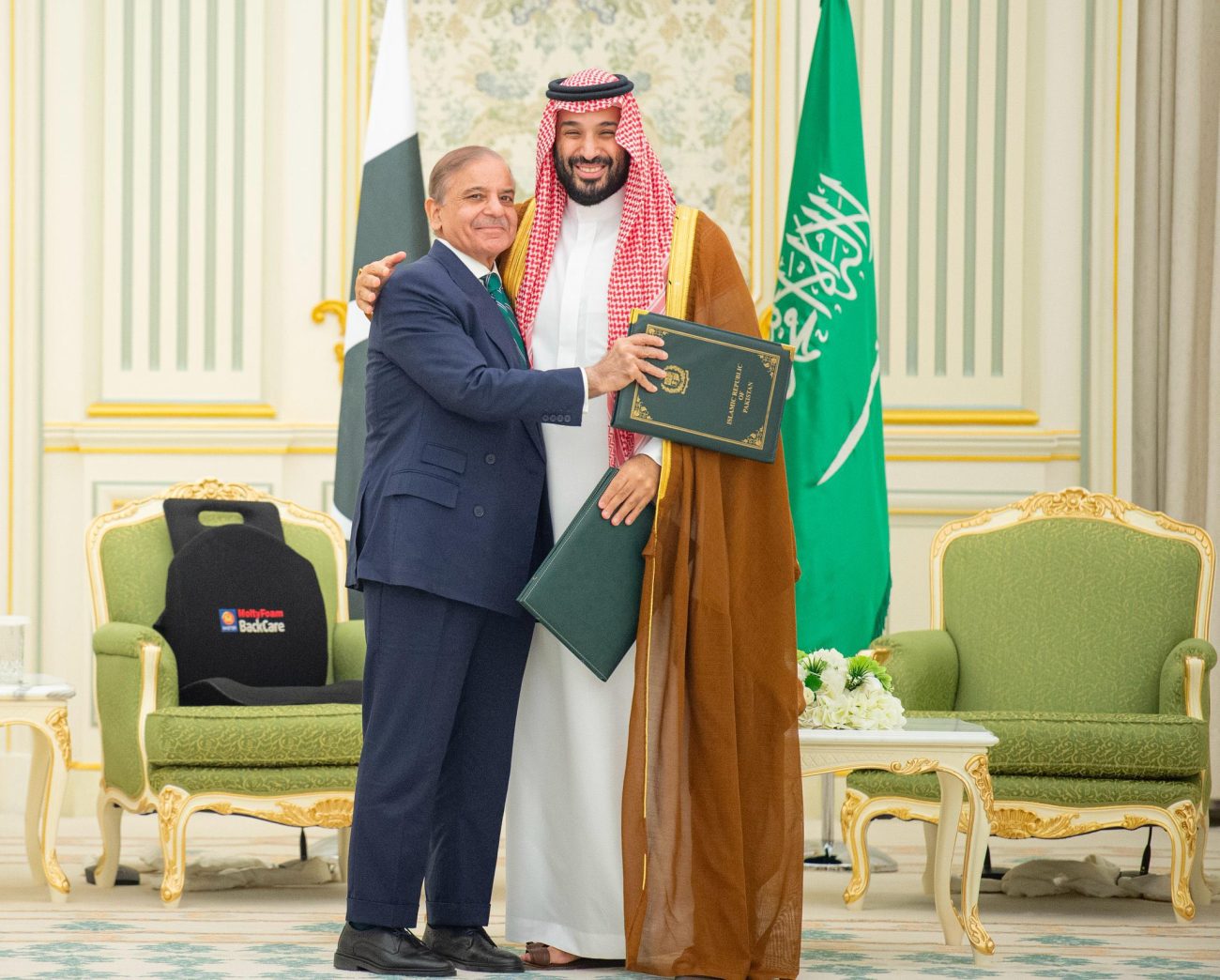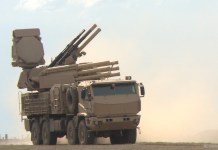The world is still studying the implications of the Saudi Arabia-Pakistan Mutual Defense Agreement (MDA) signed between the two countries last week.
While the brief statement issued by the two countries does not explicitly mention the nuclear bomb, the agreement states, “any aggression against either country shall be considered an aggression against both.”
This is widely interpreted as Pakistan, the world’s only Muslim-majority nuclear power, extending its nuclear umbrella to Saudi Arabia.
When asked whether Pakistan would be obliged to provide the kingdom with a nuclear umbrella, a senior Saudi official told Reuters, “This is a comprehensive defensive agreement that encompasses all military means.”
Furthermore, while the treaty does not explicitly mention any country, it is widely assumed to be directed at Israel, which has attacked six Middle Eastern countries since the October 7, 2023, Hamas terror attacks, among them Gaza (Palestine), Syria, Lebanon, Yemen, Iran, and Qatar.
However, extending the Pakistani nuclear umbrella to Saudi Arabia is bound to make Iran anxious, Riyadh’s regional competitor in the Middle East. Incidentally, Iran and Saudi Arabia are also engaged in a centuries-old battle for the leadership of the Muslim world along the Shia/Sunni axis.
Furthermore, this could push Turkey and Egypt to pursue their own nuclear programs.
Security experts are warning that while seemingly aimed at Israel, the move has the potential to destabilize the entire Middle Eastern region and fuel a nuclear arms race in the volatile region.
Some have gone so far as to describe the Mutual Defense Agreement between Saudi Arabia and Pakistan as a “proliferation time bomb”.
Hasan Alhasan, a senior fellow for Middle East Policy at the International Institute for Strategic Studies (IISS), has criticized the potential extension of Pakistan’s nuclear umbrella to Saudi Arabia as a destabilizing factor in the region.
He argues that the pact aims to “plug the strategic and conventional deterrence deficit vis-à-vis nuclear-armed Israel,” which could escalate tensions and erode confidence in U.S. security guarantees, potentially sparking a broader arms race.
David Albright, president of the Institute for Science and International Security (ISIS), a respected nonproliferation think tank, has long warned about Saudi-Pakistan nuclear ties, including proliferation risks.
Ghaffar Hussain, a London-based security expert and director of the Quilliam Foundation, views the agreement as carrying “more symbolic weight than strategic” but cautions that its nuclear ambiguity serves as a “shortcut to nuclear capability” against Iran, potentially fueling regional instability.
Hussain said Israel does not pose an immediate or existential threat to Saudi Arabia, and the Saudi-Pakistan deal is “more likely a hedge against Iran.”
“It can be viewed as a shortcut to nuclear capability in the event that Iran does acquire nuclear weapons. It also sends a message to the US that the Saudis are increasingly skeptical of any security guarantees Washington offers,” the security expert noted.
Broadly, the move has been described as escalatory and unnecessary, which can fuel a nuclear arms race and is fraught with nuclear proliferation risks.
However, notwithstanding the high-pitched criticism of the Pakistani nuclear umbrella for Saudi Arabia, a similar move by France was hailed as a stabilizing force.
Furthermore, nuclear powers extending their nuclear protection to their allies is an established practice in global geopolitics that has been in place for decades.

French Nukes For Europe, Russian Nukes For Belarus
In the wake of the Ukraine War and the US’s strategic withdrawal from Europe, French President Emmanuel Macron has increasingly advocated for extending France’s nuclear deterrent to protect European allies.
In March this year, in a national address, Macron warned that Europe must prepare for a U.S. that may not “remain by our side” in the Ukraine war. He announced, “I have decided to start strategic discussions on the defense of the entire continent with our nuclear weapons.
Again in May, Macron signaled willingness to station weapons in allied countries, comparing it to U.S. deployments in NATO states like Germany and Italy.
Similarly, Russia has explicitly extended its nuclear umbrella to Belarus.
On February 27, 2022, five days after the Russian invasion of Ukraine, President Alexander Lukashenko held a referendum in Belarus to change Belarus’ nuclear-free status and amend the Constitution, removing from Article 18 the phrase “The Republic of Belarus aims to make its territory a nuclear-free zone and the state a neutral state”.
Vladimir Putin said in an interview on March 25, 2023, that Russia intended to deploy tactical nuclear weapons on the territory of Belarus. At the same time, information was announced regarding the completion of a storage facility for nuclear warheads in Belarus.
In 2023, Russia officially began deploying tactical nuclear weapons (TNWs) on the territory of Belarus. On May 25, 2023, Viktor Khrenin, head of the defense ministry of Lukashenko’s regime, and his Russian counterpart Sergei Shoigu signed an agreement on the storage of Russian nuclear weapons in Belarus.
In an interview in June 2023, Alexander Lukashenko also said, “No one has ever fought against a nuclear country, a country possessing nuclear weapons. We received missiles and bombs from Russia. The bomb is three times more powerful than in Hiroshima and Nagasaki. It will kill under a million people at once”.
Russia’s 2024 doctrine names Belarus directly, reserving the right of nuclear response if Belarus is attacked.
Similarly, the US has deployed its nuclear weapons in several NATO countries as part of its nuclear sharing arrangements to ensure collective defense under NATO’s deterrence strategy, including in Belgium, Germany, Italy, the Netherlands, and Turkey.
This raises the critical question of why selective outrage over Pakistan extending its nuclear umbrella to Saudi Arabia, when this has been an established practice in global geopolitics for decades? Why this double standard when it comes to Pakistan?
Why Selective Outrage Over Pak Nuclear Umbrella For Saudi Arabia?
While Pakistani nationalists might cite this as an example of double standards in global geopolitics, at least in this particular case, the security experts have good reasons to be doubly cautious, given Islamabad’s horrendous record in nuclear proliferation, its track record as an irresponsible nuclear power, and Pakistan’s state support for terrorism.
Pakistan’s history of nuclear proliferation is well documented. Abdul Qadeer Khan, also known as the architect of Pakistan’s nuclear bomb, orchestrated a global black-market network, smuggling centrifuges, blueprints, and expertise to Iran (starting 1989), North Korea (1990s, in missile swaps), Libya (1997 onward), and possibly Syria.
Khan operated through Dubai middlemen and firms in over 20 countries. CIA Director George Tenet described him as “as dangerous as Osama bin Laden.”
The scandal erupted in 2003 when U.S.-British intelligence intercepted the BBC China ship carrying Malaysian-made centrifuges to Libya, exposing the ring.
Subsequently, under immense US pressure, Khan was arrested. In a televised confession, Khan admitted the transfers but claimed they were personal, not state-sanctioned.
However, experts are unanimous that Khan could not have operated a multi-national nuclear proliferation ring without any state support.
In fact, Pakistan is single-handedly responsible for nuclear weapons with North Korea, for the ongoing Iranian nuclear program, and for the aborted Libyan nuclear program.
Furthermore, Pakistan has been an extremely irresponsible nuclear power. It has frequently described its bomb as “Islamic Bomb,” injecting the dangerous religious aspect into nuclear threats.
Pakistani leaders routinely threaten to use nuclear weapons against India and have explicitly refused to adopt a “no first use” policy.
In August, Pakistani Army Chief Gen. Asim Munir made nuclear threats from US soil.
“We are a nuclear nation. If we think we are going down, we’ll take half the world down with us,” he said, according to reports.
The remarks were the first nuclear threats known to have ever been delivered from US soil against a third country.
Pakistan’s state support for terrorism adds another risk. Osama bin Laden and al-Qaeda have tried to get their hands on the Pakistani nuclear arsenal.
In 2001, bin Laden met Bashiruddin Mahmood, a rogue Pakistani nuclear scientist and Ummah Tameer-e-Nau (UTN) leader, to discuss the transfer of nuclear technology to al-Qaeda.
Bashiruddin Mahmood was later sanctioned by the US and UN. Incidentally, Mahmood’s son is a high-ranking official in the Pakistan Army.
There are legitimate concerns about terror sympathizers in the Pakistani establishment, who can help terrorists with a nuclear bomb.
It is precisely because of these concerns, arising from Pakistan’s own track record, that security experts are worried about Pakistan extending its nuclear coverage to Saudi Arabia.
Riyadh has long-running tensions with Tehran and has been involved in a war with the Houthis in Yemen. Pakistani nuclear coverage for Saudi Arabia is bound to escalate the situation and fuel a new arms race in the volatile Middle Eastern region.
- Sumit Ahlawat has over a decade of experience in news media. He has worked with Press Trust of India, Times Now, Zee News, Economic Times, and Microsoft News. He holds a Master’s Degree in International Media and Modern History from the University of Sheffield, UK.
- VIEWS PERSONAL OF THE AUTHOR.
- He can be reached at ahlawat.sumit85 (at) gmail.com




